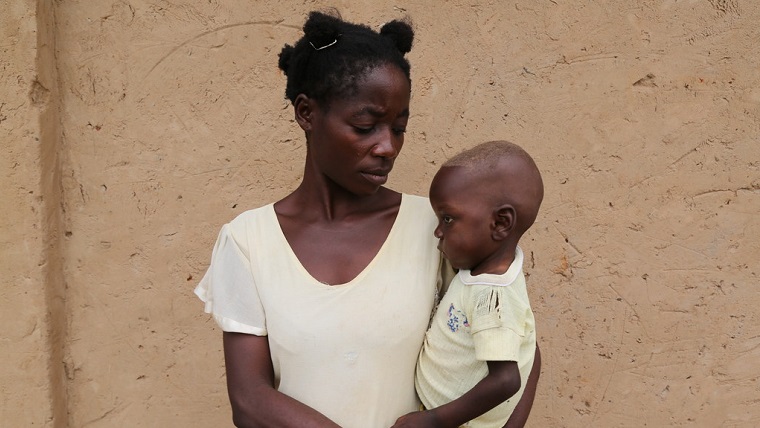Funding crisis pushes millions of Congolese people to tipping point

Millions of people caught up in a humanitarian crisis in the Democratic Republic of Congo risk rising levels of hunger, death and disease due to a lack of aid funding, a coalition of humanitarian organisations warned ahead of a conference in Geneva today.
The appeal aims to raise $1.7 billion to help over 10 million people in desperate need across the country, to date only 12 per cent has been funded. Last year’s appeal for a smaller amount was poorly funded, forcing many agencies to cut back or discontinue providing clean water, food and safety for people forced to flee their homes due to violent conflict.
More than 60 per cent of those in need of humanitarian assistance in the DRC are children: 7.9 million girls and boys under the age of 18 are in dire need of support to survive and to thrive. Urgent funding is needed to protect children affected by the crisis and to build long-term resilience in their communities.
- Anne-Marie Connor, Director of World Vision DRC
A number of factors including violent conflicts and chronic poverty, has left an estimated 13 million people in urgent need of humanitarian assistance - 5.6 million more than 2017.
In 2017, only 1.7 million people out of the 4.6 million in need of clean water and sanitation received help, leaving people drinking filthy water, defecating in the open and facing high risks of contracting water-borne diseases. Of the 4.1 million people who were acutely malnourished only 521,600 received treatment. Today 7.7 million people are suffering from acute hunger.
In the Kasaï provinces only 39 per cent of people needing aid received help between October 2017 and the end of January 2018. In Ituri, a province that borders Uganda, thousands of people are being forced from their homes by violence. Since December 2017, over 100 people have been killed as villages, schools and health centres have been burned.
The poor condition of roads means that in a country as big as Western Europe there is a huge delay and increased costs to reach areas in need. Insufficient funding for logistics and security limit the ability to deploy quickly. The UN’s fleet of helicopters which are the often the only means to transport aid to some areas may be cut due to decreased funding.
Jose Barahona, Oxfam’s Country Director in DRC, said: “The lack of funding forces us to make choices we shouldn’t have to make. We have had to limit our work to specific areas and we can only help a fraction of the people who desperately need it. In November 2017, in the conflict-ridden Kasaï provinces, we had to half food rations to 90,000 people – last month we had to restrict the rations even further with over a quarter of people receiving no food at all. Governments and international donors should learn from the past. Without sufficient aid, many Congolese people will not get the help they desperately need.”
Malek Akchour, Danish Refugee Council’s DRC country director, said: “DRC has one of the highest percentages of children out of school, which is in many areas often due to insecurity. In addition to contributing to children's education and development, schools provide a protective environment that reduces the risk of exploitation and abuse. Assisting schooling efforts and promoting children's protection and development should be a key donor priority.”
Ciaran Lavery, ACTED’s DRC country director, said: “Given the dramatic decline in conditions impacting the lives of so many, we must galvanize the support of the international community to deliver urgently needed humanitarian assistance across the DRC.”
Bernard Balibuno, CAFOD’s DRC country representative, said: “It is critical that we act now. Governments and international donors need to urgently support the funding gap. Without aid many vulnerable people will not survive. Every day, families face the horrors of conflict and violence, they have lost everything; their homes have been looted and burnt to the ground, along with clinics and schools.”
Emmanuelle Henderyckx, Caritas Belgium’s DRC country director, said: “Week after week, through humanitarian alerts from our Caritas network, we continue to see an increase in the needs of the Congolese population which we can only meet partially due to a critical lack of funds. In the Kasaï region: houses and fields have been burned down, insecurity remains, and multiple harvests have been missed. Funding is needed to help these communities to get back on their feet. We need the support of our humanitarian donors to strengthen the resilience of these communities'”
Jean-Philippe Marcoux, Mercy Corps DRC country director, said: “Over the last year, the situation in DRC has worsened. We have witnessed a gradual and continuous escalation of conflict, which is why Mercy Corps has doubled our humanitarian response and set up the Kivu Crisis Response program for displaced Congolese. This is only part of our role in DRC. We also focus on addressing the root causes of what is causing the conflict, grievances, and the lack of access to services and economic opportunities in a country where two thirds of the population is under 25.”
Edwin de Boevé, Director of Dynamo International, said: “The humanitarian crisis in the DRC is pushing more and more families to migrate to cities. Without support and away from their usual livelihoods, most of those families break up and many children end up in the streets. It is essential to support programs for the benefit of children on the street.”